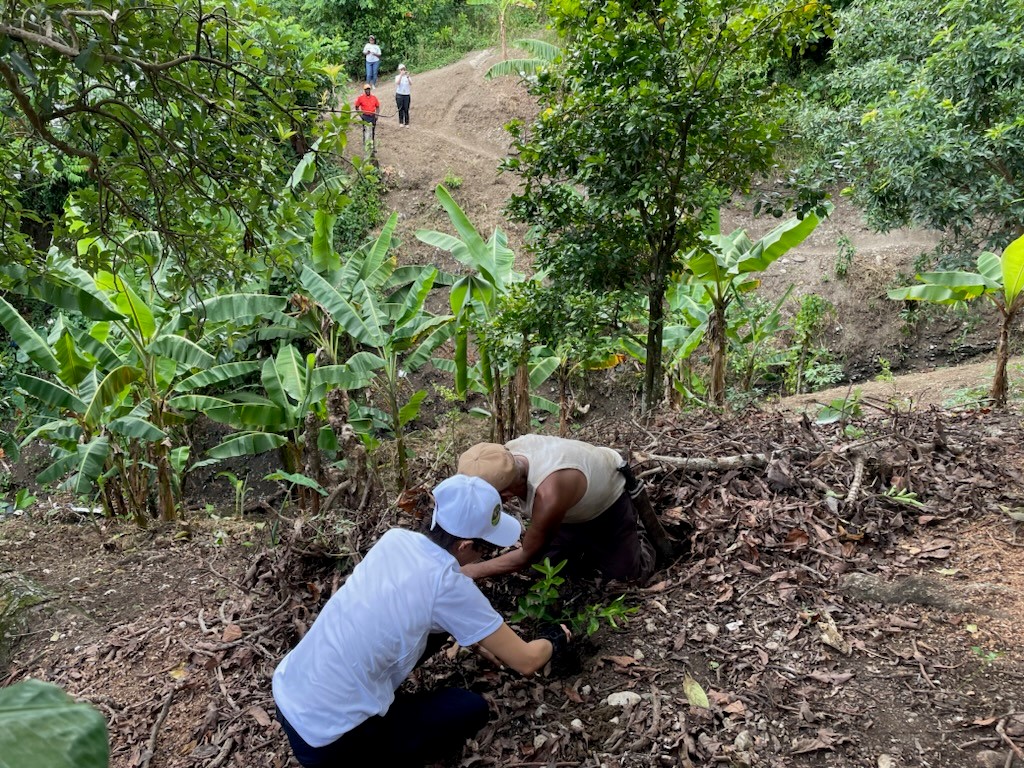Sustainable forestry farming practices that includes intercropping and tree planting to stabilize hilly forest areas against mudslides as part of the AF-funded project in the community of San Francisco in Dominican Republic. (Photo by AF)
[PROJECT STORY]: Adaptation Fund Sustainable Water and Farming Project in Dominican Republic Brings Countries Together in Learning Visit
Dominican Republic (September 2023) — As Alejandro Lorenzo led a group of visitors up a steep, winding trail around brush in the forested hills of the small rural community of San Francisco, municipality of Cambita Garabito, in San Cristóbal province – about an hour outside the Santo Domingo capital – one could sense the pride and responsibility he felt in participating directly and serving as a community leader for a groundbreaking climate change adaptation project here that has transformed the lives of his family and neighbors.
He pointed out key components of the project, from the outdoor faucets that have brought potable water directly to each home in the community for the first time, to the brand new water tank where an intricate system of aqueducts and filtration systems flows into from high up the mountain, and small local forest farms that are intercropping to diversify and sustainably manage crops to cope with the changing climate.
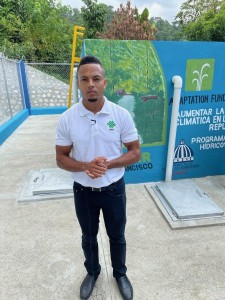
Alejandro Lorenzo pictured in front of community’s new water tank. (Photo by AF)
“Before the project arrived, the water system was very precarious,” said Alejandro, 33, who lives in the community with his four children, and parents and in-laws nearby. “We didn’t have access to water like we do now. We had to walk about 20 minutes or half hour uphill carrying two gallons by hand. It was very difficult. One had to do a lot of trips to get water, because you need water in the house to manage absolutely everything.”
As president of a neighborhood association that was instrumental in leading community support for the project from early on, Alejandro said residents came together and worked on the project directly — often lugging cement, washers and tubing high up the mountain by hand since the main dirt road becomes too narrow for cars to pass, and then helping to dig out and place water lines in steep areas often until late at night. This has installed a sense of ownership that he is confident will sustain the project moving forward. “It has been a significantly long process. Always we manage something, with every family having a committed person,” he said. “Everyone did as much as they could.”
The project, funded by the Adaptation Fund (AF) and implemented by its national implementing partner in the country, the Dominican Institute of Integral Development (IDDI), provided training and jobs to 113 community based eco-promotors like Alejandro in adaptation, engineering and maintenance of the water system – which is managed by gravity with rainwater flowing down from a reservoir at the mountaintop, passing through a purification system and eventually reaching the water tank below and outdoor faucets next to each home.
IDDI partnered with local universities to offer the eco-promoters a diploma on climate adaptation. Now, Alejandro and others are disseminating the knowledge they learned to their communities.
Yolanda Paola Lorenzo, a senior resident who donated a portion of her land to enable expansion of the water tank capacity, said a combination of droughts and intermittent torrential rains that blocked off access to the hill community had placed residents in a tough situation in recent years.
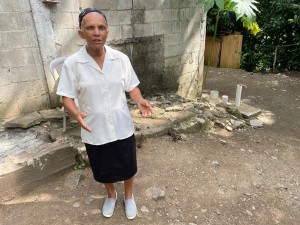
Yolanda Paola Lorenzo, a senior resident in the community. Family’s new potable water faucet pictured on right. (Photo by AF)
“It’s been a very hot year,” she said. “The past years were also very hot, but this year was very, very hot. We had to go very far to look for water. But thanks to God we survived.”
She demonstrated the strong pressure of the new clean water faucet located just outside her house, which her family can now readily access to drink, clean, cook and bathe.
In all, 110 homes in the community of San Francisco now have a dedicated water faucet. The project is installing similar multi-aqueduct systems in nine other neighboring rural communities. A total of nearly 10,000 families across 32 communities will be supported.
“Thanks to God and everything (the Adaptation Fund and IDDI) did to make it possible to bring the water,” Yolanda said. “A thousand times, thanks, and to all of the youth that supported and worked on it, and for the community, which was also a team.”
Local government and civilian guard also lend a hand in system maintenance or emergent situations.
The project included providing education to local farmers in soil management, agroforestry, plant cultivation, care techniques, marketing produce, and household uses. It established 43 agroforestry farms, in which farmers received diverse plants and conservation training.
Santo Batista Encarnacion Vega, a widower with six children, showed his varied crops flourishing on his small farm in the community’s hills, using the sustainable approach of intercropping to save land and diversify crops to weather the varied seasons — from planting trees, oranges, bananas, to varieties of avocado and other plants. These will be pivotal in sustaining the farm through harsh weather and stabilizing the sharply sloping land against disasters like mudslides.
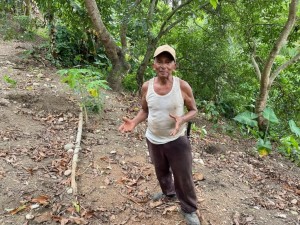
Santo Batista Encarnacion Vega, a local farmer in the community, shows diversified crops. (Photo by AF)
Local farmers like Santo were heavily affected by drought, and the project has assisted them in redirecting water to ensure their crops remain intact. They received training on using organic fertilizers from the farm’s own resources over pesticides, and constructing barriers against erosion in steep areas.
“There were years where one plant does well or bad,” Santo said. “We suffered. The community has received plants [that are diverse and can withstand seasons]. Now we are going to have what we need. Thanks to God with these institutions, and with the agreement we have formed, and with our strengths and efforts, we aren’t going to lack anything. This is our community.”
In total, the project has benefited over 24,000 people directly, including 50% women.
Arcadia Francisco, Director of the Department of Physical Works and coordinator of the AF-funded project for IDDI, said the San Francisco community is a deeply marginalized and vulnerable rural area burdened by poverty and many needs. “For decades, they had no potable water. But with this project, we’ve set up a water supply system that caters to every family,” she said, adding that it will be self-sustaining due to the community’s commitment from onset to finish. “A community association has been formed to oversee the care and maintenance of these water systems, taking responsibility for their management. Each beneficiary family of the water supply system has signed a contract with the Rural Aqueduct Community Association (ASOCAR), which establishes the rights, duties and responsibilities of each of the parties. This agreement also establishes a monthly fee that each beneficiary family must pay in order to create a community fund for the management, care and maintenance of the aqueduct.”
The aqueduct system is climate-resilient, built to withstand frequent overflows of the nearby river. Farmers also benefit from new tools like shadow management and tree pruning without causing harm. “This equips them to prune effectively, time their planting right, determine which crops to grow, and optimize them for better market yields,” Arcadia said.
Reforestation is another component of the project, which is restoring over 4,200 hectares in the middle basins of the Haina, Nizao and Yubazo rivers. Local schools, young people, teachers, women and a dedicated team of the “eco-promoters” are involved.
Arcadia said it is inspiring to see the overwhelming positive experience of the communities in furthering gender equality and empowerment by expanding job training and opportunities – from plumbing to managing water and soil, to produce better yields. The country’s first gender-focused roundtable was established, alongside another on adaptation. “Women are steadily taking charge of their self-development,” she said. “Rural women, especially from our regions, are often oppressed. But with the work we’re doing with the resources from the Adaptation Fund, we see them overcoming these challenges. We’re eager to replicate this success across the entire province.”
In fact, IDDI plans to propose two new follow-up projects through the AF, one to scale it up into highly vulnerable upper river basin communities, and another on innovation in adaptation.
Project Visit Complemented by Annual Seminar
The project visit in mid-September was the culmination of a week-long seminar held in Santo Domingo that brought together AF’s national implementing entities (NIEs) from around the globe to share lessons and experiences in project development and accessing climate finance through the Fund’s accreditation and grant funding processes. The entities are part of the Fund’s pioneering Direct Access program that empowers institutions located in countries to directly develop projects and build their national adaptation capacities along the way.
John Wakhungu Wafula, Deputy Coordinator of AF’s NIE from Kenya, the National Environment Management Authority, was especially impacted by the project visit which included a ceremony to turn the new water system on for the first time. “I could feel from the action of the community and how they were excited about the project, it’s something that will take them from one level to another,” he said. “It will increase their water security, livelihoods, health benefits from access to clean water, and it was very exciting also to see that farmer and how he has been doing the agroforestry project. To me that was very touching. If we can replicate that at scale, I think those are the kind of projects that will have a really big impact from the ground.”
Wafula said he could connect the project to the AF-funded project in Kenya, which is also aimed at adapting to drought and extreme rainfall. “That’s the feeling you always get when the community’s involved from the beginning to identify their own needs. They are involved in planning and implementation themselves. What comes out of that, it’s very satisfying.
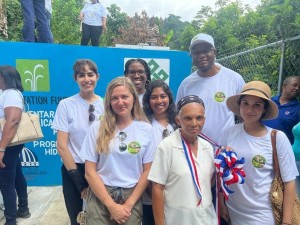
Adaptation Fund’s annual and global seminar for its accredited National Implementing Entities took place in the Dominican Republic, and was co-hosted by its NIE partner in the country, IDDI. (Photo by AF)
Nearly 30 of the Fund’s NIEs participated in the seminar, which was co-hosted by IDDI.
“The fact that our country, along with the Adaptation Fund, has come together with this fantastic team for this seminar – it’s a proud moment for us as a nation,” Arcadia said. “We’re connecting with other NIEs, understanding the challenges they’ve faced with their projects, their achievements, and the lessons they’ve learned. We’ve also been enlightened about other [newly added AF grant] avenues to access funding, especially small grants [in project scale-up, innovation, learning, and locally led action].”
An evolution that Arcadia has noticed in AF’s climate finance readiness seminars over the past few years is how the NIE community has developed a closer bond sharing experiences and tools despite their diverse countries, languages and cultures. “The Fund is banking on us as NIEs to ensure that these resources reach those genuinely in need – those unaware of the challenges brought about by global climate changes [and] connecting with these communities that desperately need the funding channeled through the Adaptation Fund,” she added.
Citing the hottest year on record, David Luther, executive director of IDDI, stressed the urgency for scaling up climate change adaptation. He called the project and IDDI’s ongoing collaboration with AF through Direct Access an “effective model” of coordination that should be replicated.
In sharing lessons with other NIEs, Wafula said the flexible space that AF offers countries to take charge of their own programs and try out new things is crucial given the dynamics of climate change. “You have to have that element of adaptive learning and innovation all the time,” he said.



